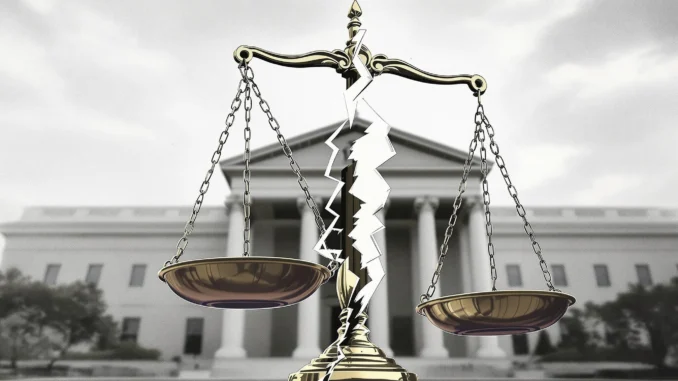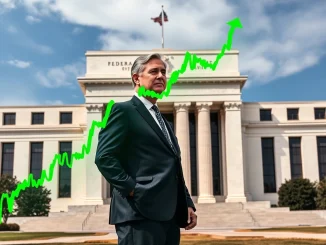
The cryptocurrency world is once again buzzing with news of potential misconduct, this time involving the ghost of a once-ambitious project: the LIBRA token. An Argentine law firm has escalated the drama, seeking a formal investigation by the U.S. Department of Justice (DOJ) and the Federal Bureau of Investigation (FBI) into the circumstances surrounding the LIBRA token collapse. But here’s the real kicker – the complaint doesn’t just target anonymous figures; it specifically points fingers at Argentine President Javier Milei, adding a layer of political intrigue to this crypto saga.
Argentine Law Firm Initiates DOJ Probe into LIBRA Token Collapse
According to reports from Cointelegraph, the Argentine law firm has officially lodged a criminal complaint with U.S. authorities. This isn’t just a casual request; it’s a formal demand for a full-blown investigation into those they believe are responsible for the LIBRA token collapse. Why the DOJ and FBI? Because the alleged financial dealings and potential fraud have international implications, and the U.S. has a significant interest in maintaining the integrity of global financial markets, including the burgeoning crypto space.
The core of the complaint revolves around allegations of insider trading and fraudulent activities that purportedly led to the demise of the LIBRA project. Let’s break down the key elements:
- Formal Complaint: Submitted to both the DOJ and FBI, signaling a serious legal pursuit.
- Target: Individuals deemed responsible for the LIBRA token collapse, with a notable focus on Argentine President Javier Milei.
- Accusations: Primarily focused on fraud and insider trading, suggesting illegal exploitation of privileged information for personal gain.
- Financial Gain: Allegations pinpoint 11 insider wallets that reportedly amassed a staggering $43.8 million by strategically selling their LIBRA holdings before the project imploded.
This move by the Argentine law firm injects a fresh wave of controversy into the already turbulent waters of cryptocurrency regulation and accountability. But what exactly are the accusations against President Milei, and what does this mean for the future of crypto governance?
Javier Milei’s Alleged Involvement in LIBRA Token Fraud
The inclusion of Argentine President Javier Milei in this complaint is undoubtedly the most sensational aspect. While details are still emerging, the complaint suggests a connection between Milei and the alleged fraudulent activities surrounding the LIBRA token collapse. It’s crucial to understand that these are currently allegations, and an investigation is being requested to determine the veracity of these claims.
Milei, already facing separate fraud accusations within Argentina, now finds himself under scrutiny on an international stage concerning his potential role in the crypto sphere. The complaint alleges his involvement in, or at least knowledge of, the insider trading scheme that purportedly enriched a select few at the expense of the broader LIBRA project and potentially, its investors.
Here’s a summary of the accusations against Javier Milei:
| Aspect | Details |
|---|---|
| Accusation Focus | Potential involvement in fraud and insider trading related to the LIBRA token collapse. |
| Context | Complaint submitted to US DOJ and FBI by an Argentine law firm. |
| Existing Allegations | Milei is already facing fraud accusations within Argentina, adding to the complexity of the situation. |
| Insider Wallets | Complaint highlights 11 insider wallets that allegedly profited $43.8 million by selling LIBRA tokens. |
It’s important to reiterate that these are allegations, and President Milei has not yet been formally charged in relation to the LIBRA token collapse. The DOJ and FBI investigation, if launched, will be critical in uncovering the facts and determining the extent of any wrongdoing and whether Milei or others are culpable.
Understanding the LIBRA Token Collapse: What Went Wrong?
To fully grasp the gravity of these allegations, it’s helpful to revisit the history of the LIBRA token itself. Launched with much fanfare by Facebook (now Meta) in 2019, LIBRA was envisioned as a global cryptocurrency aimed at revolutionizing payments and financial access. The ambition was grand: a stablecoin backed by a basket of fiat currencies, designed for ease of use and global reach.
However, LIBRA faced a barrage of regulatory hurdles and public skepticism almost immediately. Concerns ranged from data privacy and money laundering to the potential disruption of national currencies and monetary policy. Major partners, including Visa, Mastercard, and PayPal, backed out, and the project was significantly scaled down and rebranded as Diem. Ultimately, Diem was sold off in early 2022, marking the effective LIBRA token collapse.
Key factors contributing to the LIBRA token collapse include:
- Regulatory Scrutiny: Global regulators raised significant concerns, demanding stringent compliance and oversight.
- Partner Exodus: Loss of key partners undermined the project’s credibility and operational capacity.
- Public Skepticism: Concerns about Facebook’s track record with data privacy and centralized control fueled public distrust.
- Shift in Focus: The project was drastically altered from its original vision, losing momentum and appeal.
While the official narrative points to regulatory pressures and market shifts as the cause of the LIBRA token collapse, the Argentine law firm’s complaint suggests a darker underbelly – potential internal misconduct and fraud that may have hastened or contributed to its demise.
Implications of the DOJ Probe and Potential Crypto Regulations
The DOJ probe, if it proceeds, could have far-reaching implications for both President Javier Milei and the broader cryptocurrency landscape. For Milei, a formal investigation by U.S. authorities would amplify the existing fraud allegations within Argentina and significantly damage his international reputation. Politically, it could weaken his position and embolden his domestic opposition.
For the crypto industry, this case highlights the ongoing need for greater regulatory clarity and enforcement. Allegations of insider trading and fraud, especially involving a high-profile project like LIBRA and potentially a head of state, can erode public trust in cryptocurrencies and strengthen calls for stricter regulations. This could lead to:
- Increased Regulatory Pressure: Governments worldwide may feel compelled to tighten crypto regulations to prevent fraud and protect investors.
- Enhanced Scrutiny of Crypto Projects: New and existing crypto projects could face more rigorous due diligence and compliance requirements.
- Impact on Investor Confidence: High-profile fraud cases can negatively impact investor sentiment and slow down mainstream crypto adoption.
- Focus on Accountability: The probe could set a precedent for holding individuals and entities accountable for misconduct in the crypto space.
The outcome of this potential DOJ probe is uncertain, but it undoubtedly adds another layer of complexity to the already intricate world of cryptocurrency regulation and governance.
Navigating Crypto Investments: Lessons from the LIBRA Token Saga
The saga of the LIBRA token collapse, now compounded by allegations of fraud and a potential DOJ probe, offers valuable lessons for anyone involved in or considering cryptocurrency investments. Here are some actionable insights:
- Due Diligence is Paramount: Thoroughly research any crypto project before investing. Understand the team, technology, regulatory landscape, and potential risks.
- Be Wary of Hype: Projects with excessive hype and celebrity endorsements may not always be the safest bets. Look for substance and long-term viability.
- Regulatory Awareness: Stay informed about the evolving regulatory environment for cryptocurrencies. Regulatory changes can significantly impact project viability and token value.
- Diversification is Key: Don’t put all your eggs in one basket. Diversify your crypto portfolio to mitigate risks.
- Understand Project Risks: Every crypto project carries risks. Be aware of both technical risks (e.g., smart contract vulnerabilities) and market risks (e.g., price volatility, regulatory uncertainty).
- Transparency and Accountability: Favor projects that prioritize transparency and accountability. Look for open communication, audits, and clear governance structures.
The LIBRA token collapse serves as a stark reminder that the crypto space, while full of potential, is also fraught with risks. Staying informed, being cautious, and conducting thorough research are crucial for navigating this dynamic and often unpredictable market.
Conclusion: The Unfolding Drama of LIBRA and the Quest for Crypto Accountability
The Argentine law firm’s pursuit of a DOJ probe into the LIBRA token collapse, implicating President Javier Milei, marks a significant escalation in the ongoing narrative of cryptocurrency regulation and accountability. Whether these allegations hold water and lead to formal charges remains to be seen. However, the very fact that such a complaint has been filed underscores the growing scrutiny and demand for transparency in the crypto world.
As the DOJ and FBI consider this request, the crypto community and global financial watchdogs will be keenly observing. This case could set a precedent for how alleged fraud and misconduct in the crypto space are investigated and prosecuted, potentially shaping the future regulatory landscape and investor confidence for years to come. The story of the LIBRA token collapse is far from over, and its next chapter promises to be just as captivating and consequential.



